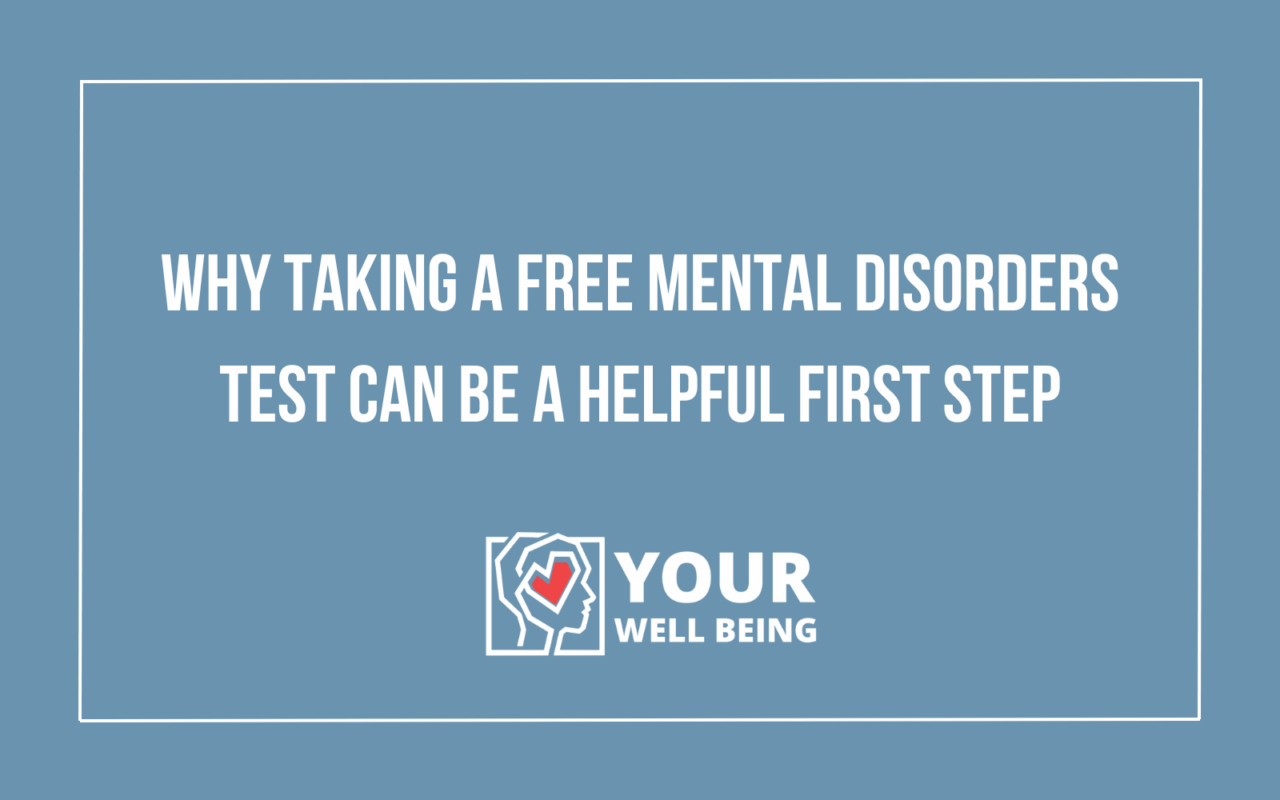Free Mental Disorders Tests
Taking care of your mental health is just as important as maintaining your physical wellbeing, yet many people struggle to recognize when they might benefit from professional support. If you’ve been experiencing changes in your mood, behavior, or thoughts that concern you, taking a free mental disorders test can be an important first step toward understanding what you’re going through and getting the help you need.
What Is a Free Mental Disorders Test?
A free mental disorders test is an online screening tool designed to help individuals identify potential symptoms of various mental health conditions. These assessments typically consist of a series of questions about your thoughts, feelings, behaviors, and experiences. While a free mental disorders test cannot provide an official diagnosis—that can only come from a qualified mental health professional—it can offer valuable insights into whether you might be experiencing symptoms that warrant further evaluation. Many people hesitate to seek help for mental health concerns because they’re unsure whether what they’re experiencing is “serious enough” or because they don’t know where to start. A free mental disorders test removes these barriers by providing an accessible, confidential way to explore your mental health from the comfort of your own home. These screening tools have helped countless individuals take that crucial first step toward healing and recovery.
Why Consider Taking a Free Mental Disorders Test?
There are numerous reasons why someone might benefit from taking a free mental disorders test. Perhaps you’ve noticed changes in your sleep patterns, appetite, or energy levels. Maybe you’ve been feeling overwhelmed, anxious, or disconnected from activities you once enjoyed. You might be experiencing intrusive thoughts, mood swings, or difficulty concentrating. Whatever your specific concerns, a free mental disorders test can help you better understand your symptoms and whether they align with recognized mental health conditions. One of the most significant advantages of these assessments is that they’re completely free and private. You don’t need insurance, a referral, or an appointment to access a free mental disorders test. This accessibility makes mental health screening available to everyone, regardless of their financial situation or geographic location. Additionally, taking a free mental disorders test can help you prepare for conversations with healthcare providers by giving you language to describe what you’re experiencing and questions to ask about potential diagnoses and treatment options.
Types of Mental Health Screening Quizzes Available
Mental health encompasses a wide range of conditions, each with unique symptoms and characteristics. A comprehensivefree mental disorders test platform typically offers multiple screening tools for different conditions. Let’s explore some of the most common types of assessments available:
Anxiety Quiz
An anxiety quiz is designed to help identify symptoms of various anxiety disorders, which are among the most common mental health conditions affecting millions of people worldwide. When you take an anxiety quiz, you’ll typically encounter questions about:
- Physical symptoms such as rapid heartbeat, sweating, trembling, or difficulty breathing that occur without an obvious physical cause
- Worry patterns including excessive, uncontrollable worry about everyday situations, catastrophic thinking, or constant anticipation of worst-case scenarios
- Avoidance behaviors like steering clear of certain situations, places, or activities because they trigger feelings of anxiety or panic
- Sleep disturbances including difficulty falling asleep due to racing thoughts, waking up frequently throughout the night, or experiencing nightmares related to your worries
- Concentration problems such as difficulty focusing on tasks, feeling mentally scattered, or having your mind go blank during stressful situations
- Physical tension manifesting as muscle aches, headaches, jaw clenching, or general feelings of being “on edge” throughout the day
An anxiety quiz can help differentiate between normal stress responses and clinical anxiety disorders that may benefit from professional treatment. Many people live with manageable anxiety for years without realizing that effective treatments exist.
Bipolar Quiz
A bipolar quiz screens for symptoms of bipolar disorder, a condition characterized by significant mood swings between manic or hypomanic episodes and depressive episodes. Questions in a bipolar quiz typically address:
- Elevated mood periods where you feel unusually energetic, euphoric, or irritable for extended periods, often lasting several days or longer
- Decreased need for sleep during certain periods where you feel rested after only a few hours of sleep or can go days with minimal rest without feeling tired
- Increased activity and energy including taking on multiple projects simultaneously, feeling restless, or engaging in more social activities than usual
- Risky behavior such as impulsive spending sprees, reckless driving, increased sexual activity, or making major life decisions without careful consideration
- Racing thoughts and rapid speech where your mind jumps quickly from one idea to another and you speak faster than usual or feel pressured to keep talking
- Depressive episodes characterized by persistent sadness, loss of interest in activities, changes in appetite or sleep, feelings of worthlessness, or thoughts of death
- Cycling patterns between high-energy periods and low-energy periods, with the frequency and intensity varying from person to person
Bipolar disorder often goes undiagnosed for years because people may only seek help during depressive episodes, or they may not recognize manic symptoms as problematic. A bipolar quiz can illuminate these patterns.
PTSD Quiz
A PTSD quiz (Post-Traumatic Stress Disorder quiz) helps identify symptoms that may develop after experiencing or witnessing a traumatic event. This assessment explores:
- Intrusive memories including unwanted, distressing memories of the traumatic event, flashbacks where you feel like you’re reliving the experience, or nightmares related to the trauma
- Avoidance patterns such as deliberately avoiding thoughts, feelings, or conversations about the traumatic event, or staying away from places, people, or activities that remind you of the trauma
- Negative changes in thinking and mood like difficulty remembering important aspects of the event, negative beliefs about yourself or the world, persistent feelings of guilt or shame, or loss of interest in previously enjoyed activities
- Hyperarousal symptoms including being easily startled, feeling constantly on guard or tense, having difficulty sleeping, experiencing angry outbursts, or engaging in reckless or self-destructive behavior
- Emotional numbness where you feel detached from others, have difficulty experiencing positive emotions, or feel emotionally disconnected from your own life
- Duration and impact of these symptoms, particularly whether they’ve persisted for more than a month and significantly interfere with your daily functioning, relationships, or work
PTSD can develop after various types of trauma, from combat experiences and serious accidents to assault, natural disasters, or sudden loss. A PTSD quiz helps determine whether your symptoms align with this specific condition.
Depression Quiz
A depression quiz screens for symptoms of major depressive disorder and other depressive conditions. These assessments typically include questions about:
- Persistent sadness or emptiness that lasts most of the day, nearly every day, for at least two weeks or longer
- Loss of interest or pleasure in activities you once enjoyed, including hobbies, social interactions, or intimate relationships
- Energy changes such as feeling fatigued or lacking energy even after adequate rest, or feeling like simple tasks require enormous effort
- Sleep disturbances including insomnia, early morning awakening, or sleeping excessively without feeling rested
- Appetite and weight changes whether experiencing significant weight loss or gain, or changes in appetite that affect your eating patterns
- Difficulty concentrating problems with focus, memory, or making decisions that weren’t present before
- Feelings of worthlessness or guilt that are excessive or inappropriate, including harsh self-criticism or ruminating over past mistakes
- Physical symptoms like unexplained aches and pains, digestive problems, or other physical complaints without clear medical causes
- Thoughts of death or suicide ranging from passive thoughts about death to active suicidal ideation or planning
Depression is one of the most common and treatable mental health conditions, yet many people suffer in silence. A depression quiz can validate your experiences and encourage you to seek support.

Schizophrenia Quiz
A schizophrenia quiz screens for symptoms of schizophrenia and related psychotic disorders. This type of assessment explores:
- Hallucinations such as hearing voices that others don’t hear, seeing things that aren’t there, or experiencing unusual sensations that can’t be explained
- Delusions including firmly held beliefs that aren’t based in reality, such as believing you have special powers, that you’re being persecuted, or that external forces are controlling your thoughts
- Disorganized thinking manifested through speech that’s difficult to follow, frequent derailment from one topic to another, or providing answers that are unrelated to questions asked
- Disorganized or abnormal motor behavior ranging from childlike silliness to unpredictable agitation, or difficulty with goal-directed behavior affecting your ability to complete daily tasks
- Negative symptoms such as reduced emotional expression, decreased motivation to engage in activities, social withdrawal, or diminished ability to experience pleasure
- Cognitive difficulties including problems with attention, memory, or executive functioning that interfere with your ability to process information or make decisions
Early intervention in psychotic disorders significantly improves outcomes. If a schizophrenia quiz suggests you may be experiencing these symptoms, seeking professional evaluation promptly is crucial.
Adrenaline Compulsion Quiz
An adrenaline compulsion quiz assesses behaviors related to thrill-seeking and high-risk activities that may indicate an unhealthy pattern. This assessment examines:
- Risk-taking behaviors where you regularly engage in dangerous activities specifically for the rush or excitement they provide, beyond normal recreational participation
- Escalating intensity where you need increasingly extreme experiences to achieve the same level of excitement or satisfaction
- Negative consequences from thrill-seeking behaviors, such as injuries, financial problems, relationship conflicts, or legal issues, yet continuing the behaviors despite these outcomes
- Emotional regulation patterns where you use high-adrenaline activities to cope with negative emotions, stress, or feelings of emptiness
- Withdrawal symptoms such as feeling restless, irritable, or depressed when unable to engage in adrenaline-inducing activities
- Impact on daily life including neglecting responsibilities, relationships, or self-care in pursuit of the next thrill or adrenaline rush
While enjoying exciting activities is normal and healthy, adrenaline compulsion becomes concerning when it interferes with wellbeing or involves dangerous risk-taking patterns that could indicate underlying mental health concerns.
What Happens After Taking a Free Mental Disorders Test?
After completing a free mental disorders test, you’ll typically receive results that indicate whether your responses suggest symptoms consistent with specific mental health conditions. It’s essential to understand that these results are not diagnoses but rather indicators that professional evaluation may be beneficial. Many free mental disorders test platforms provide resources for next steps, including information about finding mental health professionals, crisis hotlines, and treatment options. If your free mental disorders test results suggest you may be experiencing symptoms of a mental health condition, the most important next step is scheduling an appointment with a qualified mental health professional. This might be a psychologist, psychiatrist, licensed counselor, or your primary care physician who can refer you to appropriate specialists. These professionals can conduct comprehensive evaluations, provide official diagnoses when appropriate, and develop personalized treatment plans that may include therapy, medication, lifestyle changes, or a combination of approaches.
Taking Action for Your Mental Health
Taking a free mental disorders test represents an act of self-care and courage. Acknowledging that you might be struggling and actively seeking information demonstrates strength, not weakness. Mental health conditions are medical conditions that deserve attention and treatment, just like physical illnesses. The earlier you identify potential concerns and seek appropriate support, the better your outcomes are likely to be. Remember that mental health exists on a spectrum, and everyone experiences challenges at different points in their lives. Whether you’re dealing with temporary stress, a situational crisis, or symptoms of a diagnosable condition, support is available. A free mental disorders test is simply one tool in your mental health toolkit—a starting point for understanding yourself better and accessing the resources you need to thrive. If you’re ready to take that first step, consider completing a free mental disorders test today. Its easier than you think, simply visit our website and browse through our quizzes today! Your mental health matters, and seeking understanding is the beginning of healing.


